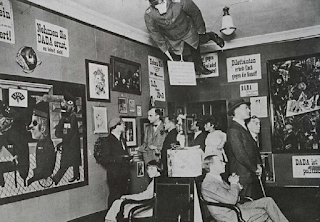Art and Anarchism 1.1 - Roots of Anarchism, the Paris Commune, Proudhon and Courbet
During 1840's Paris was an home to neo-Hegelians who thought that the freedom could only be attained through our ability to realize that metaphysical concepts (goodness, justice, love...) are mere objectifications of human experience through the history, are illusive in nature and no ideal apart from "humanity" really exists. They were all friends with Proudhon (French thinker and economist) who has published his famous critique of the capitalism and state to declare "property is theft" and to propose a society based on equality, law, and the union of order and anarchy. In the light of this statement the anarchist movement started to spread through Europe.
In the opening chapter of "Du principe de l'art" where he compiled his position on the anarchist philosophy of art, Proudhon stated that the book was inspired by the French Government's refusal of exhibiting Courbet's "Return from the Conference" (image below) who has previously shocked the public through his depiction of peasantry in a very crude, raw aesthetic, breaking in pieces the artistic boundaries between poor, rich, cultured, uncultured... in state's annual art exhibition where elite culture reigned. His artistic expression was not the only reason why Courbet was banned. During the short reign of the Paris Commune (1871), French peasantry was at the height of unrest and upper classes have perceived Courbet's art to be a provocation against their power. They have solved the problem of the upheaval by yielding part of their power to the Bonaparte's dictatorship but Courbet kept on painting and called his new style "Realism". "Return from the Conference" was one of those paintings, depicting drunken clergy to point at the degeneration of the church.
A couple years before the events (1865), Proudhon wrote his major statement on the government's ban on Courbet's paintings called: "On the principle of art and its social purpose" and praised Courbet for extending the anarchist social critic and their case for social change into the realm of art. The same year, Emile Zola responded to Proudhon and argued the extension of anarchism into the arts to be an aesthetic issue, and not a social one. In my next blog post I will be going into the details of this argument.


Comments
Post a Comment